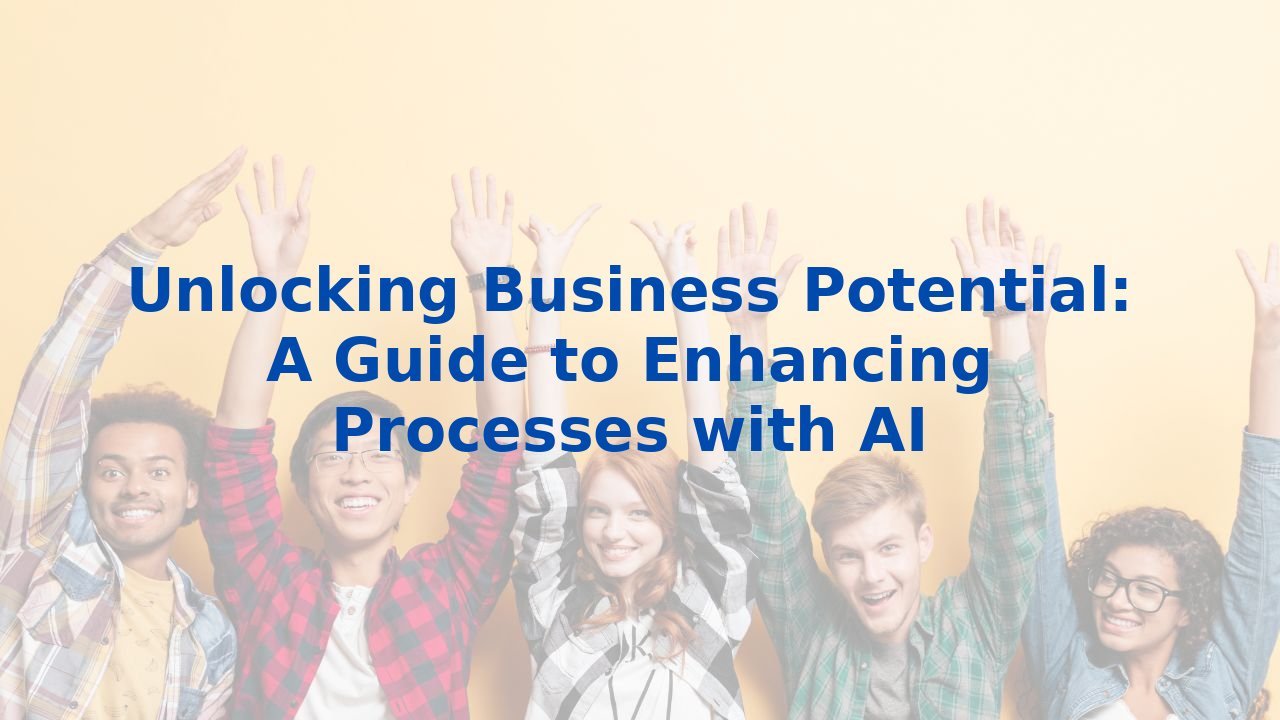Unlocking Business Potential: A Guide to Enhancing Processes with AI
Unlocking Business Potential: A Guide to Enhancing Processes with AI
In the modern landscape where speed and efficiency reign supreme, organizations are constantly in pursuit of avenues to optimize operations, reduce expenses, and enhance decision-making. Enter Artificial Intelligence (AI)—a game-changer that stands at the intersection of technology and business processes. This guide will uncover how AI can enhance key business processes, focusing on the tangible benefits that come with its integration while emphasizing the need for employee training in this new era of work.
Understanding Business Processes
At the heart of every successful organization lies effective Business Process Management (BPM). This systematic approach focuses on the continuous oversight and improvement of various processes to boost efficiency and productivity. Since its emergence in the late 1980s, BPM has evolved into an essential tool for organizations across various sectors, addressing inefficiencies and discovering opportunities for growth.
How AI Enhances Business Processes
The advent of AI has revolutionized BPM by offering advanced capabilities for process simulation, analysis, and optimization. Let’s explore how AI is reshaping traditional business processes:
1. Process Simulation and Optimization
AI's capability to analyze historical process data allows organizations to identify patterns and dependencies effortlessly. By integrating these insights into simulation models, companies can experiment with different scenarios, calculate key performance indicators (KPIs), and pinpoint potential bottlenecks—all before making any real-world changes.
2. Automated Process Discovery and Mapping
With AI's process mining functionality, data from various systems such as customer relationship management (CRM) or enterprise resource planning (ERP) can be automatically analyzed to model existing processes. This visualization aids companies in understanding flow, pinpointing individual steps, and detecting any deviations from standard procedures—enhancing clarity and operational accuracy.
3. Real-Time Monitoring and Decision Support
AI enables organizations to keep a finger on the pulse of their operations. Real-time monitoring offers up-to-the-minute data on process statuses, allowing businesses to react swiftly to emerging issues. Beyond just monitoring, AI can assist in complex decision-making by simulating alternatives and suggesting optimal choices based on extensive data analysis.
4. Predictive Analytics and Risk Management
Imagine being able to foresee future process scenarios. AI equips businesses with predictive analytics, helping them identify potential bottlenecks ahead of time and adjust strategies accordingly. This proactive approach not only mitigates risk but also allows companies to adapt dynamically to changing market conditions.
5. Automated Task Execution and Error Reduction
Routine tasks often consume valuable time and resources. AI shines in automating these tasks, including document processing, which minimizes human error and liberates employees to focus on strategic initiatives. The efficiency gained allows for faster turnaround times and a more agile workforce.
Benefits of AI in Business Processes
Integrating AI into business processes is not merely a tech upgrade; it’s a strategic move with far-reaching benefits:
- Improved Efficiency: AI significantly reduces the time spent on manual data handling, promoting speed and agility.
- Enhanced Decision-Making: By offering predictive insights, AI empowers leaders to make more informed choices.
- Reduced Errors: Automation leads to greater accuracy, minimizing the risk of human oversight.
- Increased Productivity: Freeing employees from monotonous tasks allows them to channel their creativity towards higher-value projects.
- Better Customer Experience: AI can analyze customer interactions and feedback, refining service processes and elevating satisfaction levels.
The Role of Employee Training in AI Adoption
The benefits of AI rise exponentially when employees are trained adequately to harness these innovations. Training is not merely an additional step; it’s a vital component of successful AI integration:
- Understanding AI Tools: Employees must familiarize themselves with new AI tools and approaches to fully embrace them.
- Data Analysis Skills: Basic data analysis capabilities will empower employees to extract and act on AI-driven insights.
- Adaptability: With technology evolving rapidly, being adaptable is essential for a seamless transition to AI-driven workflows.
- Continuous Learning: An ongoing commitment to skill enhancement ensures teams stay updated with the latest advancements in AI.
Conclusion
AI is not just a buzzword; it is a transformative force reshaping how businesses operate and thrive. By embracing AI for process simulation, task automation, real-time insights, and predictive capabilities, organizations can witness remarkable improvements in efficiency and effectiveness. However, this journey toward AI integration should not overlook the importance of employee training. Investing in the continuous learning of your workforce is crucial—a bold step that ensures a truly synergistic relationship between humans and AI in driving your organization towards sustained success. For organizations keen on unlocking the full spectrum of AI potential, consider exploring options for comprehensive training solutions that equip your workforce with the necessary skills for tomorrow.



